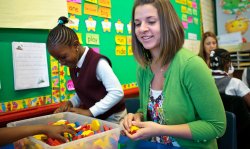Montclair State University is committed to the creation and development of teachers who strive to exemplify the knowledge, skills and dispositions required for excellence in teaching.
The centerpiece of our work is a document called the Portrait of a Teacher, which, through a series of statements, embodies Montclair State University’s vision of an educator and informs the evaluation of candidates to the teacher education program, the assessment of student teaching, and the professional development of our community of teachers.
Montclair State University envisions teachers who:
1. Have expert knowledge of subject area content and relevant pedagogy:
- Have deep understanding of the major concepts and principles of the disciplines they teach.
- Have extensive knowledge of the research, teaching methodologies, technologies, core learning standards, and resources specific to those disciplines
- Possess broad-based knowledge within and across the liberal arts to situate their teaching in current and historical global contexts
- Demonstrate exemplary literacy and communication skills; can speak and write English fluently and communicate clearly and appropriately
2. Understand learning and development as complex processes that take place across the lifespan:
- Understand how children, adolescents and adults learn and develop in a variety of school, family and community contexts
- Know, evaluate and apply relevant theories of learning to teaching practice
- Take initiative to know each student as a unique individual who brings varied backgrounds, strengths, needs, and perspectives to learning
3. Apply knowledge of learners, disciplinary content, pedagogy, and assessment to teach effectively:
- Provide culturally and linguistically responsive instruction that respects diversity of ability, age, class, ethnicity, gender, language, race, religion, and sexual orientation to support the academic achievement of all students
- Plan and implement rigorous instruction that engages all students in meaningful and challenging learning
- Promote creative thinking, critical thinking, and critical consciousness within and beyond the classroom
- Create curriculum, instruction, materials and assessments that are universally designed and accessible to support the intellectual, social and personal development of all students
- Use multiple forms of assessment to measure and evaluate impact on student learning, achievement and progress, and to inform instruction
4. Create democratic learning communities that are engaging, caring, respectful, and inclusive:
- Model attitudes, values and behaviors that promote democratic practice and participation in the classroom
- Create supportive and empathetic learning environments that are safe spaces conducive to learning
- Facilitate learning through effective, shared classroom management
5. Embrace leadership roles to create collaborative partnerships with school colleagues, families, and agencies in the community to support students’ learning and well-being:
- Join with other school professionals to plan and implement strategies that meet the needs of all learners
- Consistently communicate and work with families to establish shared expectations for students and to engage families in the school community
- Seek and use resources available through community and local institutions to actively build partnerships that enhance instruction and learning
6. Demonstrate dispositions critical to the teaching profession:
- Believe that all children can learn and should have equitable access to knowledge
- Are reflective practitioners who remain active in the profession, and continually inquire into the nature of teaching and learning to improve their teaching practice
- Advocate for students and for educational policies that support best practice
- Demonstrate integrity, honesty and understanding of professional ethics, roles and responsibilities
- Demonstrate passion for teaching, lifelong learning, and commitment to the mentoring of future teachers
